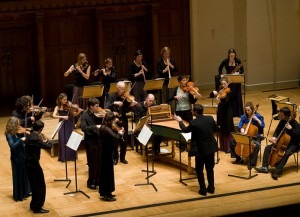 Happy New Year to all!
Happy New Year to all!
What better way to begin the New Year than listening to Bach in a concert you did not expect to be in?
On the evening of the 31 December, having wondered from café to café in Soho for the entire afternoon, we were not only highly caffeinated but also looking for a nice place to see the new year in. Wigmore Hall was running a wonderful programme of Bach cantatas and the 5th Brandenburg Concerto, but tickets had been sold off for weeks. Thanks to three strangers who were kind enough to go find something else to do that evening and returned their tickets, we managed to sneak in at the last and listen to an excellent presentation of the Retrospect Ensemble.
The programme was carefully picked out and put together: a Christmas cantata, the Brandenburg concerto and ending with a wonderful Magnificat. The Retrospect Ensemble is a young group in London that has had very good reviews in recent years and I was looking forward to seeing them live. With a sizeable chamber group and singers, they filled the small stage at Wigmore Hall completely. When the harpsichord came in, they were almost falling off. Which made it all the more charming – the group members played and sung with such gusto and charisma that it was impossible not to feel elated by them. The director, Matthew Halls, who also played the keyboard, lead the group with great attention to detail and with apparent love. The sopranos, countertenor, tenor and bass all complemented each other perfectly.
The first part of the programme, the cantata “Unser Mund sei voll Lachens” (“May our mouth be full of laughter”) was an excellent concert opening. Bach wrote it in Leipzig for Christmas Day 1725. It is a wonderfully happy piece, full of exultant choir and celebratory instrumental sections. It opens with a French Overture in the style of Lully. You can imagine very well a corps de ballet adopting it for a choreography. The formal, dotted patterns are perfect for dance – and I don’t think there is enough new baroque music ballet out there.
After the overture, the cantata truly comes into its own and the voices take over. The counterpoint dynamics of the singers and the high-low interplay of the pitches is very rich, almost overwhelming, so that you abstract your experience and stop listening to the notes, transposing them into music in its pure state.
The 5th Brandenburg Concerto was very well executed. I am a huge fan of this concert, in particular of its sublimely chaotic-ordered solo in the Allegro. To hear it again at Wigmore Hall, this time with the clock ticking away towards the new year, was very special and made me feel a kind of gentle abandon that made me very happy.
The last section, the Magnificat in D (BWV 243) was suitably grandiose and regal. It was Bach’s first really large-escale and complex piece of music, according to Christoph Wolff, composed to show off in Bach’s first Christmas in Leipzig in 1723. Throughout the years, Bach re-worked the piece entirely, changing the key from E flat to D major and removed Christmas-specific interpolations, says Gawain Glenton. To each line of text exulting in its devotion to God, the instruments offer a different character, growing in each section until, at the end, the five soloists and the full chamber group are in a climatic trance, transmitting passion and form at the same time.
So, for those of you who haven’t yet this year heard Bach live, go to any concert hall, any church, any park, subway station or street corner, wherever he is being played and rejoice at the New Year. Or go out and play yourselves to celebrate this new beginning!
Ps. After my last article on Sala Sao Paulo (https://interlude.hk/in-tune/sala-sao-paulo-travelling-in-music/), Juliette and I were approached by Artec, the firm that planned and constructed the hall, asking us to kindly mention their work. Not only is it a pleasure to do so, but it was an excellent opportunity to discover more of about their projects (www.artecconsultants.com). It has made me think more and more about concert hall designs – hopefully I can learn enough to write about it here soon!
Unser Mund sei voll Lachens:
Photo credit: http://www.retrospectensemble.com/
